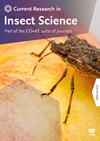The fallacy of the integrated pest management paradigm and the need for its OFF seasonal shift in the management of tropical fruit flies (Diptera: Tephritidae): The case of Ceratitis capitata
IF 2.7
Q1 ENTOMOLOGY
引用次数: 0
Abstract
The Mediterranean fruit fly (medfly) is a serious frugivorous Afro-tropical pest common in the Mediterranean Region in Europe, which, despite the requirements of Directive 2009/128/EC and the availability of biological methods, is still widely controlled using pesticides.
Our objective was to reassess the suitability of the classical Integrated Pest Management (IPM) paradigm for medfly control and the feasibility of its mission to promote biological methods as an alternative to pesticides. For this purpose, different IPM scenarios were simulated for three hypothetical farms located along the 1000 km latitudinal transect in Italy using the PESTonFARM model.
The simulations revealed a fundamental flaw in the classical IPM paradigm. By disregarding the ability of medfly to inconspicuously increase its population before the economic (action) threshold is reached, it alerts the farmer too late. By then, the medfly population enters the phase of exponential growth, when gradually acting biological methods are unable to cope. The guidelines of classical IPM reinforce the tendency of farmers to focus on large medfly populations during summer, strengthening the reliance on pesticides as the most effective option at the time.
We hereby propose to move away from principles of monitoring-based and threshold-initiated control and target the sparse population of overwintering medflies before they can be detected by monitoring. The control starts on earliest fruits, even if not usually infested to a noticeable extent, and gradually continues to protect subsequent fruits. Our results confirmed that the proposed approach is highly effective, allows for the reliable use of non-pesticide methods of fruit fly control, and therefore ensures that the key ambitions of IPM can be achieved.
有害生物综合管理范式的谬误及其在热带果蝇(双翅目:蝗科)管理中的非季节性转移的必要性:以头角杆菌为例
地中海果蝇(medfly)是欧洲地中海地区常见的一种严重的果食性非洲热带害虫,尽管有2009/128/EC指令的要求和生物方法的可用性,但仍在广泛使用农药进行控制。我们的目的是重新评估传统的有害生物综合治理(IPM)模式对蝇类控制的适用性及其促进生物方法替代农药的可行性。为此,使用PESTonFARM模型对位于意大利1000公里纬向样带的三个假设农场进行了不同的IPM情景模拟。模拟揭示了经典IPM范式的一个根本缺陷。由于忽视了在达到经济(行动)阈值之前介蝇不明显地增加其种群的能力,它提醒农民太晚了。此时,介蝇种群进入指数增长阶段,逐渐采取生物方法无法应对。经典IPM的指导方针强化了农民在夏季集中处理大量介蝇种群的倾向,加强了对农药的依赖,使其成为当时最有效的选择。因此,我们建议放弃基于监测和阈值启动的控制原则,在监测发现之前,将目标锁定在越冬蝇的稀疏种群上。这种控制从最早的水果开始,即使通常没有明显的侵染程度,并逐渐继续保护后来的水果。我们的研究结果证实,所提出的方法是非常有效的,可以可靠地使用非农药的方法来控制果蝇,从而确保IPM的关键目标可以实现。
本文章由计算机程序翻译,如有差异,请以英文原文为准。
求助全文
约1分钟内获得全文
求助全文
来源期刊

Current Research in Insect Science
Agricultural and Biological Sciences-Animal Science and Zoology
CiteScore
3.20
自引率
0.00%
发文量
22
审稿时长
36 days
 求助内容:
求助内容: 应助结果提醒方式:
应助结果提醒方式:


